 |

CHENNAULTMEN WHIP JAPANESE COMMUNICATIONS
HQ., 14TH AIR FORCE, June 28 (Special to The China Lantern) - The full range of tactical and strategic air operations with the exception of heavy bombing and aerial combat was covered by missions of the Fourteenth Air Force in the period June 20 to 26. FromKalgan, north of the Great Wall, to Vinh in French Indo-China, airdromes, aircraft on the ground, ocean-going shipping, gunboats, oil barges,troop-laden passenger boats, junks, sampans, dock areas, railyards, locomotives and rolling stock, bridges, troop concentrations, supply dumps,warehouses, power plants and ammunition dumps were struck without air opposition.
Fourteenth Air Force mission against enemy airdromes accounted for the damage of destruction of 19 enemy aircraft. Mustangs destroyed seven enemy aircraft and damaged four more in strikes at Tsinan and Tehsien airdromes on June 24 and 25. On June 24, four additional aircraft were strafed on the ground on the Japanese airdrome at Changtien, east of Tainan. The day before, Mustangs of the Fourteenth Air Force hitWhite Cloud Satellite field at Canton, strafing three enemy aircraft on the ground, leaving one smoking. On the same mission they damaged a communication station.
RECORD LOCOMOTIVE HAUL
One hundred and fifty-one locomotives were destroyed or damaged in attacks on various Japanese-held yards during the period covered.Record days were on June 24 and 25 when fighters and medium bombers of the Fourteenth Air Force Chinese American Composite Wing destroyed or damaged73 locomotives north and south of the Yellow river. Twenty-three locomotives were destroyed or damaged in operations on June 22 in this area extendingas far north as Peiping, while 13 more were accounted for on the Tsin Pu and Ping Han railroads on June 26.
Earlier in the week Mustangs and Mitchells on June 22, operating in northern French Indo-China, destroyed or damaged 16 locomotivesin that area; came back the next day and destroyed or damaged 17 more.
Other attacks in French Indo-China, made on these same days included railroad shops and yards which were bombed and strafed atThanh Hoa, Phu Dien Chau, Phy Lang Thuong, Hanoi, Yen Ly and Vinh. Besides their destruction or damage of locomotives, much rolling stock was destroyed.
RIVER TRAFFIC HIT
At Taku, port of Tientsin, on June 20, Mustangs heavily damaged an ocean-going freighter and tug-boats. During the week, river Japanese shipping losses on the Yellow river, the Yangtze, the Siang, the West and the Lung rivers totaled more than 254 craft, including130 junks and sampans caught in a concentration northeast of Liuchow on June 22.
The Fourteenth Air Force continued to give air support to Chinese Ground Forces operating around Liuchow and on the Honan front.At least 600 troop casualties were inflicted by the Fourteenth Air Force during the week, 350 of them being accounted for by fire-bombingwest and southwest of Hsihsiassuchi in Honan.
More than 108 trucks were destroyed or damaged from June 22 to 26. Mustangs caught a concentration of enemy motor trucks threemiles north of Hengyang on June 21 and destroyed 95 vehicles and damaged 50 others.
EVERYTHING BUT MONOTONOUS
CT ‘G-5’ Section Rescues Fliers, Fluctuating Currency
CHUNGKING, June 28 - The G-5 section of Lt.-Gen. A. C. Wedemeyer's China Theater headquarters - unique among American G-5 sections on all fronts - influences and sometimes directs such varied activities as rescuing downed fliers, setting production schedules, stabilizingfluctuating currency exchange rates and increasing guerrilla operations, it was revealed here.
Under the direction of Brig. Gen. George Olmstead, of Des Moines, Ia., a graduate of West Point and a prewar business executive,G-5 handles the greater part of complex relations between the United States Army and Chinese and other civilian agencies. Every day G-5performs minor miracles which helps to gear Chinese economy to the war effort.
As part of their assignment, Olmstead and his assistants procure military supplies from local factories, stimulate production ofmilitary and essential civilian goods, advise the Chinese government on the control of inflation and the development of long-range economicpolicies aimed at a progressive, modern post-war China.
UNIQUE IN WORLD
The G-5 section in China is unique in that its functions and responsibilities are found in no other war theater. Under Gen. Eisenhower, G-5 is concerned with only military government and civil affairs. In China, military government is only one of G-5's numerous branches.
|
Assisting Gen. Olmstead are his executive officer, Maj. W. C. Donaldson, of New York City and the heads of six branches: Col. CarlJunge, Lincoln, Neb., Lt. Cols. Herman A. Hauch, Marathon, N.Y.; Walter G. Sylvester, Jersey City, N.J.; Paul J. H. Murphy, Staunton, Va.;A. J. Binsfield, Des Moines, Ia. and Wesley B. Edwards, Washington, D.C.
Their offices in Chungking comprise the nerve center of a network of activities which affect or are effected by every military action in China. They determine China's military lend-lease requirements and screen requests for civilian goods.
SIX BRANCHES
The production branch, which works with 25 civilian experts, helps to supply qualified technical advisors to the Chinese WarProduction Board. The procurement branch attempts to buy as much as possible from China on a reverse lend-lease basis - a job complicatedby China's spiraling inflation. The civilian economy branch has corrected the inflow of gold and is working to prevent hoarding. Ifrecommendations are approved, the military government branch may train Chinese officers as military governors for recaptured territory.
G-5's "clandestine branch" works as a coordinating unit for all quasi-military activities, often of a highly delicate nature,using any forces possible against the enemy.
|
China Would Welcome Russia
In Jap War, Says General Ho
KUNMING, June 26 - (AP) - Gen. Ho Ying Chin declared at a press conference Monday night that he would welcome Russianentrance into the war against Japan; that he would like to see the Americans invade Japan and land simultaneously in China; that China intendsto recover both Formosa and Manchuria, and that Emperor Hirohito should be tried and punished as a war criminal.
Chiang Kai-shek's chief of staff gave these answers in a remarkable "No hold barred" interview granted in connection with thevisit of American correspondents on the ATC junket from the States to China, before entertaining them with the resident correspondents at abig dinner party at the Generalissimo's Kunming home.
The question period followed the reading of a long prepared statement which among other things emphasized that "every bullet, everyrifle" from the United States will be used in the war against Japan. This point was later elaborated when Gen. Ho stated that no lend-leasesupplies were being used by the Central Government troops in the Chinese northwest.
Asked what were the prospects of a reapproachment between Chungking and the Yenan reds, Ho said that the policy of the CentralGovernment was aimed at a unified China and "It's up to Yenan to decide this problem."
Gen. Ho expressed the belief that the Japanese will continue to fight in China even if cut off from their homeland; that "the timewill be very long" if the Chinese forces alone are left to clean up China - "and we would still need American equipment." At the present,Chinese military needs cover everything except tanks, which would be of little use in southeast China.
The general said that the Chinese had long hoped for Russia's entrance into the war, but recognized the difficulties as long as theywere occupied with Germany.
HIROHITO WAR CRIMINAL
Asked about Formosa, he said, "Formosa was Chinese territory and we mean to get it back."
"And Manchuria too? he was asked.
"Yes, Manchuria too," he said.
The general expressed the hope that Chinese forces could land on Japan, and participate in the suppression of the Japanese militarypower. He said he favors the de-industrialization of Japan, especially as regards war plants, but that the future of Japan should be decidedby all the United Nations - "China cannot decide alone."
He expressed the opinion that bombing the Japanese imperial palace would help to hasten the defeat of the Japanese; that Hirohito"was naturally a war criminal because of his position as supreme commander," and "he should be tried and given the punishment that's due him."
|
GUAM, June 28 (AP) - Gen. Joseph W. Stilwell made his first appearance on Okinawa last night as commander of the AmericanTenth Army while Japan awaited the next move by the United States forces that conquered the strategic island only 325 miles south of Tokyo.
Gen. Stilwell stood with 500 of his troops atop Hill 80 on Okinawa's southeast coast as the American flag was raised to honor themen of the 7th Infantry Division who wrestled this last defense ridge from the enemy.
There is still scattered action in Okinawa. Japanese hideout remnants ambushed and killed six American soldiers yesterday.
In the north, mop-up squads herded 802 more prisoners into the stockades, boosting the enemy losses to 111,351.
145 Allied PWs Bayoneted By Japs
CHUNGKING (ANS) - Inexperienced Korean troops who trembled so they could not wield their weapons effectively, were forcedby the Japanese to bayonet to death 145 American and British prisoners at a Jap prison camp in April, 1944, United Press reported quoting a sub-lieutenant who deserted the Japs at Swatow. He said the Japs picked sick prisoners for bayonet practice and that about 220 Japsparticipated, divided into three groups of which were allotted about 50 prisoners. The prison camp, he said, was located in a mountainous areaso no civilians witnessed the executions but other prisoners witnessed the whole proceedings.
WITH AMERICAN EQUIPMENT -
Girls In Guerrilla Army Help Speed Japanese Withdrawal
By GEORGE WANG
NANNING, Kwangsi (Delayed) (UP) - American equipped Chinese guerrillas are playing an important part in forcing theJapanese to abandon this overland corridor of 200 airline miles. I talked with the general in command of the forces in this province, who hasa four-figure number of guerrilla fighters under his command, many of them equipped with one carbine and one 45-caliber pistol. In addition,his units are equipped with Thompson machine-guns, flame throwers, bazookas, American binoculars, bombs, radio-sets, and movie cameras.
|
Everywhere along the Jap corridor throughout this province, his men are destroying bridges, telegraph lines and bombing warehouses, brothel houses, barracks and Jap headquarters. They also collect reports of the activities of Japanese agents.
CHERCHEZ LA FEMME
The general's force is composed mostly of Chinese young men and girls, most of them volunteers. It was his men who re-enteredNanning on May 27 after his radio-sets were placed inside the city to first report the Jap withdrawal. His men also gave the news of thewithdrawal to Gen. Chang Fa-kwei, who commands the main body of regular Chinese forces which were standing by in the mountains in the west, and who hurried his men in to re-occupy the territory relinquished by the enemy.
The guerrilla general is a young man, in his thirties, with sharp piercing eyes. His wife is also a member of the guerrilla force.
Reminding me that it was tea-time, she invited me into the dark reception room of her guerrilla residence and told her husband,"Don't forget to tell Mr. Wang of the valuable work done by your girls." "Oh, yes," the general recollected, "without you women, nothing is perfect."
China Plans Vast Railroad Program
BALTIMORE, MD., June 28 (AP) - Chinese railway officials now touring the United States declared China will be a prime marketfor railroad equipment after the war.
Present plans call for the construction of 20,000 miles of Chinese railroads immediately after hostilities cease, according to E. S. Mao, a member of the touring party.
Mao said that more than 90 percent of China's 13,000 miles of pre-war railroad have been destroyed in the destructive battles on Chinese soil.
The major element in rehabilitation of the Chinese rail system will be standardization of equipment, in place of the conglomeration of various British, American, French, German and even Japanese standards which prevailed in pre-war days.
|
HQ., 14TH AIR FORCE - Combat Radio Reporting Team 6, equipped with microphones and wire recording equipment, is now touringthe Air Force bases to tell in sound the story of the air war in China, it was announced this week.
The voices of the Air Force personnel and the sound of their aircraft will be heard from coast-to-coast in the States over the facilitiesof the Blue Network, on the program "The Fighting AAF," which is heard every Saturday afternoon at 1330 to 1400 hours EWT.
The team is comprised of Air Force men, all of whom were announcers, special events men or broadcast technicians in civilian life. Capt.
Frederick L. Smith, Frederick, Md. Henry C. Garretson, Jr. Milton A. Schreiber Whitman J. Severinghaus Albert J. Bottorf Wyan E. Thiessen TO BE CAPTAIN TO BE FIRST LIEUTENANT Charles H. Ham Patrick J. Harrity Herman Kretzer |
The production is handled by Corp. George M. Watson, Boston, Mass., former program director of Station WHDH, Blue Network station in Boston. The team's technician is Corp. William Breedon, Los Angeles, Cal., in civil life an engineer with KSFG, Los Angeles.
On temporary duty with the team is SW/Sgt. Jake Causey, Greensboro, N.C. of the 14th Air Force's 'Jiggs Squadron,' who flys thecombat missions with Capt. Sheldon. Causey was formerly advertising and public relations man with WBIG, CBS's affiliate in Greensboro.
The team records combat missions, interviews returning pilots, picks up human interest stories and special events, like the recentGI show, "Oklahoma," and speed them to the States by air for rebroadcast there.
The recent bombings of Liuchow by medium bombers of the 14th Air Force was described for stateside listeners by the team's radio reporter who accompanied the mission.
Families of the personnel who participate in the broadcasts are notified by the Blue Network of the time and date of the programsin which they will be heard.
|
CHINA COAST PUPPETS
REPORTED SURRENDERING
CHUNGKING, June 28 (UP) - The authoritative newspaper Ta Kung Pao states that since the Japanese withdrawal in Fukien, puppet troops in the coastal regions have been surrendering on a mass scale.
Approximately 1,500 puppet troops stationed on numerous small islands off Fukien surrendered together with their commandingofficers. Two commanders of the puppet Peace and Salvation Army surrendered to the Chinese with their arms and a few Japanese prisoners.
Air Dropping Unit Given 74 Medals
A 14TH AIR FORCE BASE, China - Capt. Edward Chinn's air dropping unit, which is attached to the 69th Composite Wing, recently was singled out for special honors by its commanding general, Brig.-Gen. J. C. Kennedy, who personally presented medals to 74 members of the organization.
|
Capt. Chinn and three enlisted men were awarded the Bronze Star Medal, 33 men were presented the Distinguished Flying Cross, 34others received the Air Medal, three men were awarded the Purple Heart Medal, and S/Sgt. Ernest Barnes, whose heroic exploits were describedin the May 11 issue of The China Lantern, received the Soldier's Medal.
The citations accompanying the awards stressed the fact that the logistical problems involved in the recent Salween campaign made the air dropping of supplies to the front-line Chinese troops an absolute necessity, and that months of bad weather, the jagged terrainand the enemy ground and fighter plane opposition made such operations extremely hazardous.
THE BATH-HOUSE OF PAOSHAN
|
In Yunnan province, for instance, you will find lots of things that have nothing to do with personal cleanliness, but which expressthe essential difference between east and west. In certain Yunnan villages one finds chickens with their feather growing backwards. One findstrees bound together with lacings of enormous spiders, whose coarse webs act as a vast and permanent barrage for flying insects, and in these webs squat the huge spiders, spreading across the sky between the treetops, like a stationary but watchful screen of fighter planes. And incertain of the Yunnan and Kweichow villages live the aborigines of the Miao tribes, where a practice is still observed that even Marco Polomarveled at seven centuries ago. This is couvade, whereby the wife about to have a baby sneaks off into the fields, and has the childwithout fuss or excitement, while the husband takes to his bed and stays there for a week or two, the object of village sympathy and solicitude,and the recipient of gifts of wine and delicacies with which to allay the troubles of childbirth.
I could continue in this vein for a long time, but such digressions, while they prove that things are very different out here, lead away from my subject, which is the principles of cleanliness as practiced in what we used to call the Inscrutable East.
The average Chinese, for instance, spurns the stupid affectation of a handkerchief. He clears his throat and hawks magnificently, or he places his fingers gracefully against his nose and blows stupendously into street or gutter. Even to me, after months in China, it stillrather astonishing to see a delicately beautiful little lady of China with a mouth a coral and a skin of alabaster, and beautifully gowned in the finest silks, stooping over a gutter and blowing her nose into the street, or clearing her throat with a mighty roar and spitting dexterouslyand expertly between the feet of the scurrying throng. Some of the Chinese are extremely accurate at this practice, and some - I can vouch sadly and personally for this - are regrettably poor in aim. Apart from question of accuracy, I am not critical of the practice, which seems tome to be more hygienic, if less aesthetic, than our Western custom of using a piece of cloth as a receptacle, and carrying cloth and contents aroundfurtively in our pockets.
Many of the aristocratic women of China, particularly the older ones, also carry beautifully carved and decorated sets of picks. They are made usually of old ivory, are of various shapes and sizes, look rather like odd items from an elaborate manicure set, and are actually picks for teeth, nose and ears, and in certain circles are used quite openly for the removal of particles of food, wax, and other things . . .
Now all this leads up to my bath at Paoshan (pronounced "Bow-sharn"), the last of the green valleys before one hits the twisted, tortured wildness of the Salween, near China's westerner frontiers. This is not exactly the first bath I had had in China, but it was the firstfor a long time, and the first of its kind in my life. I had been driving a jeep up and down the Burma Road, which at that time was alternately a sea of mud or a vast, drifting cloud of choking yellow dust. When I say I am filthy I make the understatement to end all understatements. Sowhen my American friend said to me: "Would you like to have a hot bath?" I looked at him in unbelieving adoration and asked him to lead men to it.
"There's a Chinese Army bathhouse in Paoshan," he proffered. Have you ever been in a Chinese bath-house before?
I shook my head, still rather stunned by the information that there was any sort of hot bath available in this feudal province of China,where the drinking water was invariably too hot to drink and the bathing water far too cold for comfortable bathing.
"Well," he grinned, "this will be an interesting experience. It's not a very good bath-house - there are some wonderful ones up north - but it should be interesting."
|
The bath-house was behind a filthy, tumbledown shop of dilapidated stone and grimy, spotted walls and dark shadows, in a narrow, cobbled street just inside Paoshan's battlement walls. We were escorted to a sort of dressing room - a long and dismal apartment, containing somerickety oddmants of furniture that somehow reminded me of the little shops on the hill of High Street, in St. Kilda, and a long bench, upon whichwere seated half a dozen nude Chinese men, all sipping weal tea from shallow China bowls.
Everybody nodded and chatted volubly in Chinese as we came in, and while we undressed we had long conversations about Chinese politicsand the course of the war. Nobody understood anybody else, but it must have been stimulating and refreshing talk, and it covered the embarrassmentof stripping in front of the Chinese who watched us eagerly and kept talking excitedly among themselves pointing at the two foreigners who cringed nakedly on the bench while an attendant poured scalding tea into the shallow bowls. They were obviously commenting on our white skin andhirsute limbs. The door to the room was wide open, and several ragged little urchins, mostly little girls, stood there looking at us wonderingly, and discussing the phenomena in awed whispers . . .
We had been sitting over the tea bowls for about half an hour - so cold that even the gooseflesh had begun to harden - before a bullying looking man, with huge muscles, and clad only in a pair of blue shorts, motioned to us that our baths were ready.We walked nakedly through the throng - the news had gone abroad that the foreigners were bathing, and quite a crowd had gathered - and itparted to let us through, with its components grinning widely and shouting a chorus of "Ting Hao" ("very good"). I muttered a deprecatory"Ma-ma fou-fou!" ("not good, not bad") and everybody screamed with laughter.
We were ushered to two dank and dismal rooms, each containing a sodden floor, musty, dark-brown walls, infested by spiders, and covered with Chinese ideographs almost obliterated by grime, and two vast stone baths, hacked from the living rock, and of a slimy evilgrey-green color. A couple of small boys, with coolie panniers over their shoulders supporting wooden pails of hot water, shambled in and filled my bath.I gathered that they were doing the same for my friend next door. In the second bath in my room was a dazed-looking Chinese, with glassy eyes.He was sprawled in the enormous stone thing, partly covered by water, obviously trying to recover from his ordeal. His beetroot-colored skin,gave the impression that he had been lashed by scorpions.
The bullying looking fellow, who was, I discovered, the bath attendant, motioned me curtly to get in the bath. Not daring to flouthis authority, I eased myself in gingerly, thinking furiously of things like dermatitis, leprosy, elephantiasis, barber's rash, and other things too horrible to mention. I had soaked for about five minutes when the attendant, who had been watching me malevolently, motioned me to get out.Again I obeyed, and stood there shivering while he laid a series of planks across the top of the bath. I noticed that the crowd of boys and girlspeering in the window and pressing in through the door had grown enormously, and about eight of them had been forced right into the room, where theystood watching me with shyness and wonderment in their eyes. They paid no attention to the stunned Chinese on the other bath. The bathattendant motioned sullen instructions to me, and I merely stretched my quaking body on the planks. Then he went to work on me,].
For twenty minutes I creaked and groaned and signed and panted, but the fellow was without mercy. He used a large, grey-looking clothwhich he soaked in water every few minutes, wrong it out thoroughly, and then proceeded to scrape the dirt out of me with a fierce rubbing,flicking motion that sent sheets of flame skating across my skin. The dirt peeled off in great grey sheets and wafers - a really horribleand discouraging, yet fascinating, sight. I am sure a few layers of epidermis came off, too. I kept thinking of the men who use a blow-torch to peelthe old paint off wooden houses, but after a time I couldn't think at all, for I was numbed with cold and pain.
The operation went on and on. Out of the corner of my eye I saw that a man had come into the room, propped himself nonchalantlyin the corner, and was making sketches of men on a scratchpad. I was too exhausted and pain-racked to protest that I wasn't an artist's model.Following the instructions of the tyrant with the cloth I twisted and turned like a disjointed acrobat, bruised by the hard planks beneath me, smartingwith the rawness of those sections of my body that had already received attention. When he came to scrape my legs he hooked my feet beneath his chin
|
When I thought I could stand it no longer - my body felt like a redhot, swollen balloon of smarting skin filled with a jumbled and disconnected mass of bruised bones - the planks were suddenly drawn away from beneath me and I was precipitated into the greasy bath filled with water.Five minutes later I dumbly followed his admonition to get out and stood there trembling while two grinning boys with wooden buckets sluiced me downwith ice water. The shock almost killed me, but I was too tired to offer any objections. I just cowered there, shivering and miserable. Towels weretaboo, so one just shivered until one was dry again, and then limped back to the dressing room, where hot green tea was waiting and bowls ofwater for final face-washing.
The bath cost me 500 dollars (Chinese). For weeks I used to terrify myself wondering what diseases I had picked up in that evil place,but I must have some sort of queer immunity, because nothing happened. When I came back through Paoshan my American friend asked me did I feel like a hot bath. I was very dirty again but I said no thanks. I would wait until I got back to Kunming and have a cold shower.
|
Championship hopefuls hailing from Maine to Texas and New York to California, from the rankest of amateurs to some seasonedprofessional mittmen, in all weights and classes, have poured entries into the Theater Special Service Office for the All-China ChampionshipBoxing Tournament at the Hangar Playhouse, APO 627, on July 2, 3, and 4th.
All ranks and class are
|
Competition in the heavyweight class would seem to be keen as several former amateur champions have indicated their desire tocompete. Among the early entries were: Corp. Wayne Choate, 210, Fort Smith, Ark. who has won heavy titles at Camp Claiborne, La., in 1943, and at the British-American Tourney at Ramgarh, India, last year.
Other representative heavies were Pvt. Arvel Goodman, 195, Cincinnati, Ohio, Miami Beach and Chanute Field champ and winner of theCYO Golden Gloves at Peoria, Ill.; Pfc. Roy Hawkins, 195, Portland, Ore., Pacific Coast Amateur Heavy title-holder in 1944, who has only two losses in112 battles; and Pvt. Kenneth Jason, 200, Chasset, Mass., former Mass. State AAU heavyweight champion and Yankee Division crown winner.
The most popular class in the early returns was the middleweight division, with former amateur and club champions galore. Amongthese were Corp. Frank Chisari, 155, New York City, and Pvt. John Eurasel, 160, St. Louis, Mo., who has fought in St. Louis and at Dow Field,Bangor, Maine, at his present weight.
Other top-flight mittmen in this class are: Pfc. Charles Leeper, 164, Indianapolis, Ind., Indianapolis City Tourney winner; Pfc.Mark Osa, Fort Warren regimental champion who has fought in the All-American bouts at Calcutta; T/Sgt. Joe Ruscigno, San Jose, Cal., Westover Field, Mass., champ in 1943; Sgt. Mel Shields, Houston, Texas, former Northeastern Golden Gloves champion; Corp. Lawrence Wallace, Chicago, Ill., Chicago Golden Glover and Bombay, India, champion; and Corp. Irving Woods, local crowd-pleaser.
Talented leather-slinging is promised in the Senior Welterweight class between Pfc. Eddie Fulkerson, 154, who has 60 amateur battles in the Mid-Westand on the Coast; Pfc. Epifanio Garcia, San Antonio, Texas, Latin-American tourney competitor; Corp. Ralph Marins, Brooklyn, N.Y., CYO championin New York for four years and winner of a flock of Army Post titles, and Pvt. Alfred White, Richfield, Utah, 147, former National Guardwinner.
Scaling quickly down through the lighter battlers we find T/Sgt. Wendell Wilkinson, 137, Cleveland Golden Glover and popular localringman; Pvt. Dick McDonough, 135, with High School boxing and club amateur experience; and Pfc. Roger Harris, New York City, 134, unbeaten
|
Coming into the squared circle at 127 pounds is our houseboy, Chen Shung, hailing from Bangkok, Thailand; Sgt. Robert McInnis,New Haven, Conn., 115, was Scott Field champion in the novice Bantamweight class, and Sgt. Louis Foytik, Galveston, Texas, registering at 105,ranks as the lightest man in the tourney.
The China Lantern nomination for the bout of the tournament involves two glove-throwers whose names are both a linotypers nightmare and announcers headache. The battle of the Polysyllabic names would bring together two novice welterweights: Pfc. David Kaluhiokalani(correct), APO 210, and Pvt. John Shawanopenass (correct), from the same area.
Nearly a hundred others ranging in experience from those who have had only a few fights to battlers who are entering the ring for the first time, any of whom may prove a surprise of championship proportions, have sent in early entries.
All the battlers will be weighed in and receive their physical examination on Sunday, July 1, at the Hangar Playhouse, and the matchingand order of the bouts will be posted that afternoon in readiness for the opening night's action on Monday.
First China Rodeo At ITC On July 15
U.S. CHINESE TRAINING CENTER - The first rodeo ever to be held in China will whoop into existence at the Infantry TrainingCenter's North Compound on Sunday afternoon, July 15th, when bronc-busters from Brooklyn to Brownsville fork China-side mounts in thestateside manner through a series of eight events.
With Pfc. Loyce Morris, former Arizona rider already completing construction of pens and chutes, WASC headquarters extended a helping hand in the form of fifteen head of steers, while the Remount Depot will supply horses and mules.
Lt. Charles Lakin of the Signal School, general manager of the show and himself an old rodeo hand, listed the events, for whichthere will be no entry fees: parade; bareback riding (horse); bareback riding (mule); steer riding; steer roping; Roman race (bareback, 2 horses); roping from a jeep; grand finale (chariot race). Prizes have not yet been announced.
Whip-legged Sgt. William (Whitey) Powell, of ITC, ex-trick rider and virtuoso of things equestrian will clown throughout the show employing as a feature of his repertoire the rubber barrel so hated by bulls. At the conclusion of hostilities between man and beast, there will be a barbecue in the Western way, standing room only.
Applications for entry should be sent to the Special Service Officer, ITC, APO 627.
| |||||||||||||||||||||||||||||||||||||||||||||
WEST CHINA RAIDERS - Sparkling pitching, which resulted in the change in the standings, dominated the play in the WestChina Twilight Softball League for the first half of June.
The Signals, who shared the league lead for the month of May, lost their batting eye entirely being twice the victims of no-hit, no-run pitching performances and dropped to sixth place in the loop.
Sgt. Clarence Vrba pitched an almost perfect game for the Snafu Ten on June 8 as his mates parlayed five hits into a 1-0 triumph over the Signals. Vrba faced only 22 men over the seven inning route, retiring the last 16 in order to chalk up the no-hitter.
Pvt. Walt Zenick authored the circuits second no-hitter on June 14, hurling the Ficons to a 5-0 whitewash of the Signals. Zenick fanned 11 and walked three and was never in trouble as his mates led by Sgt. Paul Gladden, got six hits for the easy win.
Shutouts were a dime-a-dozen as on the same day Headquarters blanked Skomsky's Sluggers 1-0 behind the two-hit hurling of Pfc.Ray Weber, and the China Falcons overwhelmed the Rumor Mongers 11-0 with Sgt. Earl Martin limiting the losers to five hits.
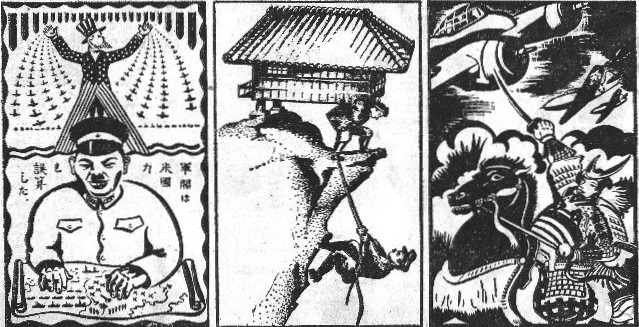
AMONG LEAFLETS DROPPED ON JAPAN by Superforts are these three illustrations.Left, the caption says in part: "The Gumbatsu (military clique) miscalculated America's production strength;"center, "The Gumbatsu is pulling the nation down to ruin;"right depicts a Japanese feudal warrior combatting American planes while caption points out the logic of honorable surrender againstoverwhelming odds.
Monthly Meeting Of Master Masons July 2
KUNMING - Kwei Chu Hui, the club for Masons who are officers of American and Chinese forces, will hold its monthly dinnermeeting in the Red Cross Town Club, Monday, July 2, 1945 at 1830.
Col. James C. Frank, president, has issued a special invitation for Allied civilians who are master Masons to join with the clubat this meeting. An interesting program is being arranged for the roof of the Alliance building following the dinner.
‘Town Club’ Expanding Recreational Space
KUNMING - Recreational facilities at the Red Cross Town Club are expanded to include eleven special activities rooms, Mr.Robert C. Schnitzer, New York club director, has announced.
After taking over the second floor of the Alliance Building in which the club is housed, the Red Cross staff has set to workredecorating and planning individual rooms for ping-pong, billiards, radio listening and cards.
One room will be used for a library, which will be augmented gradually till 1,000 books are on the shelves. Books will be loanedout as an added service.
DARK ROOM
Photography enthusiasts will have an enlarged dark room in which they can develop their pictures, and members of Red Cross classes and clubs will meet in a new conference room.
On the first floor the lounge and game room will be merged creating one giant lounge better able to cope with the hundreds whoflock to the club on enlisted men's nights.
"With these additional rooms and the expansion of the lounge, I think we shall be able to serve twice as many men or the same number of men twice as well," said Mr. Schnitzer.
"If we need to enlarge the dining room seating space, we'll do that too, although our kitchen is limited in its production," hedeclared.
THOSE WONDERFUL ARs COVER EVERY SITUATION
1350TH AAF BU, ATC, KUNMING - Corp. John Tallon, Brooklyn, N.Y., a veteran of the African and Italian campaigns, related this unusual incident here recently.
The guests at a Cairo hotel were awakened one night by wild screaming in the corridor and discovered a beautiful gal in an extremenegligee fleeing madly from a gentleman who was in extreme dishabille. The next day it developed that the impetuous Romeo was a major. He waspromptly court-martialed.
His lawyer won his acquittal by virtue of the following paragraph in the Army manual: "It is not compulsory for an officer to wear a uniform at all times, as long as he is suitably garbed for the sport in which he is engaged."
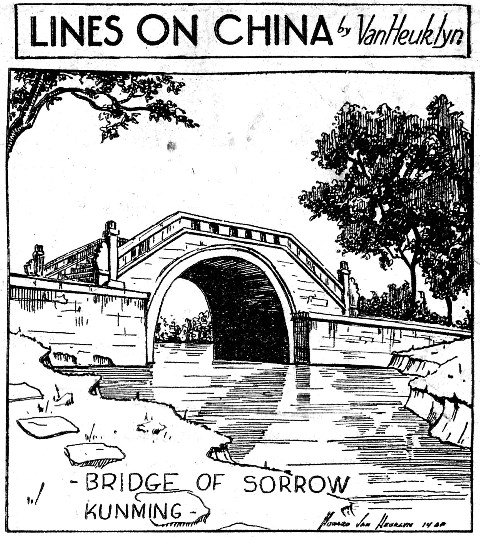 |
This Week Over XNEW
A special "Command Performance," one of the most widely publicized of the series, will get its first China airing over Station XNEW next Wednesday evening, July 4, at 2030 hours, when the station broadcasts "The Wedding of Dick Tracy."
Some of the nation's top comics are cast in the parts of the popular Stateside comic strip, with Bing Crosby taking the part of "Tracy," songbird Dinah Shore playing "Tess Trueheart," and Bob Hope cast as "Flattop."
In supporting roles are Frank Sinatra as "Shaky;" Frank Morgan as "Vitamin Flintheart;" Judy Garland playing "Snowflake;" Cass Daleyin the part of "Gravel Gertie;" Jerry Colona cast as the Chief of Police; The Andrews Sisters are billed as the "Summer Sisters" and their sister and Jimmy Durante is the "Mole."
In addition to what Stateside magazines have called hilarious dialogue, the 55 minute program features the characters singing songswith original lyrics set to the tune of popular songs. Life magazine featured this program for servicemen in a spread in one of their recenteditions to reach China.
Meeting Planned For Mormon Servicemen
In an effort to co-ordinate the church activities of Mormon servicemen in China, the members of the Church of the Latter Day Saints are urged to communicate with Chaplain Lee W. Dalebout at APO 689, or Pfc. Max B. Skousen, AACS, APO 627.
The monthly Theater Church news will be sent to all members and efforts will be made to bring together the members of Mormon faith.
Plans are being formulated for a church conference of all Latter Day Saints personnel in China, with the anticipation that it will take place within the next couple of months.
Information with regard to Sunday Mormon Services may be obtained at the American Red Cross 'Town Club.'

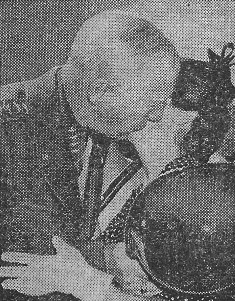 PATTON PUCKERS - Gen. George S. patton, Jr., home from Europe, is welcomed at Washington by a friend, Mrs. Humphrey Scott. PATTON PUCKERS - Gen. George S. patton, Jr., home from Europe, is welcomed at Washington by a friend, Mrs. Humphrey Scott. |
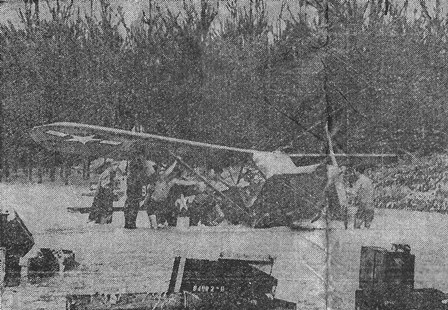 THE RAINS CAME on Okinawa, causing flood which damaged war machinery of men fighting Japs. Here crew members of Army Air Force Cub Plane Liaison Squadron help ground fighters stripped for action in rescue of plane caught in rising water. Boxes of supplies float in foreground. THE RAINS CAME on Okinawa, causing flood which damaged war machinery of men fighting Japs. Here crew members of Army Air Force Cub Plane Liaison Squadron help ground fighters stripped for action in rescue of plane caught in rising water. Boxes of supplies float in foreground. |
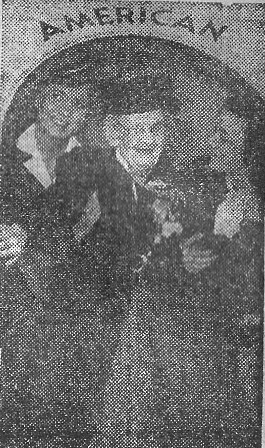 CENTURY FLYER - Mrs. Irene Woods of Chicago celebrates 100th birthday anniversary by taking first airplane ride. CENTURY FLYER - Mrs. Irene Woods of Chicago celebrates 100th birthday anniversary by taking first airplane ride. |
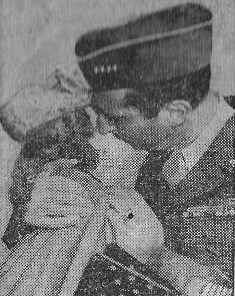 CLARK CONNECTS - Gen. Mark W. Clark kisses his wife after a "homecoming" parade in Chicago on Memorial Day. CLARK CONNECTS - Gen. Mark W. Clark kisses his wife after a "homecoming" parade in Chicago on Memorial Day. |
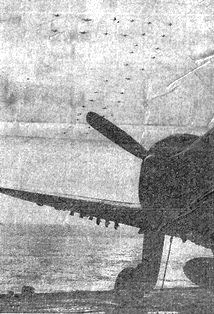 POWER PORTRAIT - Navy Corsair is silhouetted on deck of aircraft carrier USS Enterprise as planes above fly in V formation over Pacific waters. Display of 34 planes of different types is Navy's symbolic appeal to the home front to support current Seventh War Load Drive. POWER PORTRAIT - Navy Corsair is silhouetted on deck of aircraft carrier USS Enterprise as planes above fly in V formation over Pacific waters. Display of 34 planes of different types is Navy's symbolic appeal to the home front to support current Seventh War Load Drive. |
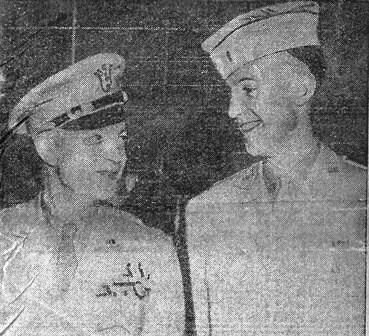 EISENHOWER AND SON - Gen. Dwight D. Eisenhower and his son, Lt. John Sheldon Eisenhower, leaving a banquet given for the general inWashington. Young Eisenhower was graduated from West Point on June 6, 1944, the same day Ike sent Allied troops across the English Channelto land in Northern France. EISENHOWER AND SON - Gen. Dwight D. Eisenhower and his son, Lt. John Sheldon Eisenhower, leaving a banquet given for the general inWashington. Young Eisenhower was graduated from West Point on June 6, 1944, the same day Ike sent Allied troops across the English Channelto land in Northern France. |
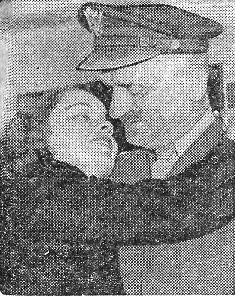 SMACKER FOR SPAATZ - His daughter Carla welcomes Gen. Carl A. Spaatz upon his arrival at Washington June 6. SMACKER FOR SPAATZ - His daughter Carla welcomes Gen. Carl A. Spaatz upon his arrival at Washington June 6. |
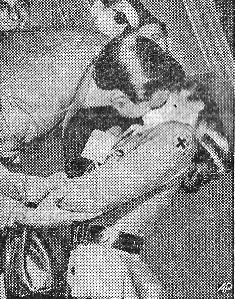 GI GRABS - An unidentified Yank soldier just home leans from a bus and snatches a kiss from the first girl he sees. GI GRABS - An unidentified Yank soldier just home leans from a bus and snatches a kiss from the first girl he sees. |
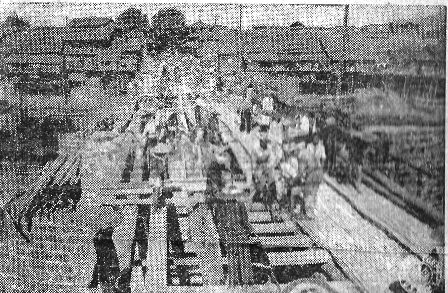 EIGHTEEN HUNDRED YEAR OLD BRIDGE over Yuan Ho now being readied for heavy convoy traffic.While construction proceeds, traffic is limited to one way. EIGHTEEN HUNDRED YEAR OLD BRIDGE over Yuan Ho now being readied for heavy convoy traffic.While construction proceeds, traffic is limited to one way. |
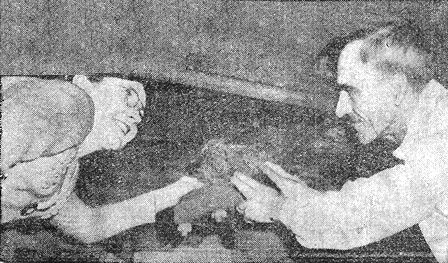 TRAVELING NEST - Trainman Arthur Fletcher helps Mrs. Lillian Howell remove robin's nest from undercarriage of railroad car inBarrington, Ill. Nest had been commuting with train between Chicago and Barrington, where mama bird would meet it and sit on eggs till trainleft again. TRAVELING NEST - Trainman Arthur Fletcher helps Mrs. Lillian Howell remove robin's nest from undercarriage of railroad car inBarrington, Ill. Nest had been commuting with train between Chicago and Barrington, where mama bird would meet it and sit on eggs till trainleft again. |
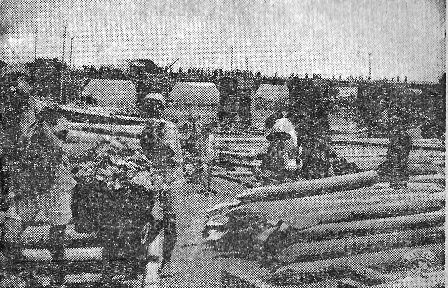 HUNDREDS OF CHINESE COOLIES - working under the supervision of the Burma Road Engineers speed repairs on the ancient Yuan Hwo bridge near Chihkiang. HUNDREDS OF CHINESE COOLIES - working under the supervision of the Burma Road Engineers speed repairs on the ancient Yuan Hwo bridge near Chihkiang. |
The CHINA LANTERN is the newspaper for the United States Forces in the China Theatre and is published three times weeklyby Lt. Lester H. Geiss, Editor-in-Chief, for military personnel only. Lt. Harry D. Purcell, Managing Editor; Lt. Maurice Pernod, Production Chief. Pfc. Richard P. Wilson, Reporter. Editorial offices: Hqrs., SOS China Theater, Kunming, China, and Hqrs., SOS, Calcutta, India. Printed by Ajit Kumar Sinha at the "Amrita Bazar Patrika" Press, Calcutta. Unless specifically stated, news and features appearing in the China Lantern do not necessarily represent the views ofthe War Department; the Commanding General, USF, CT, or any other official source.

JUNE 29, 1945
Adapted from the original issue of The China Lantern
Better quality image of Hazel Brooks used in this re-creation
Copyright © 2019 Carl Warren Weidenburner
TOP OF PAGE PRINT THIS PAGE ABOUT THIS PAGE
SEND COMMENTS CLOSE THIS WINDOW
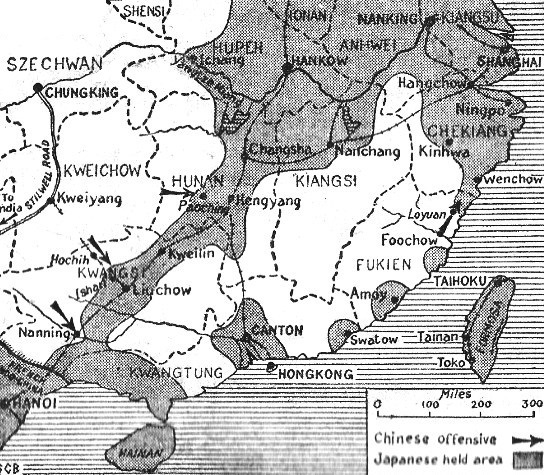
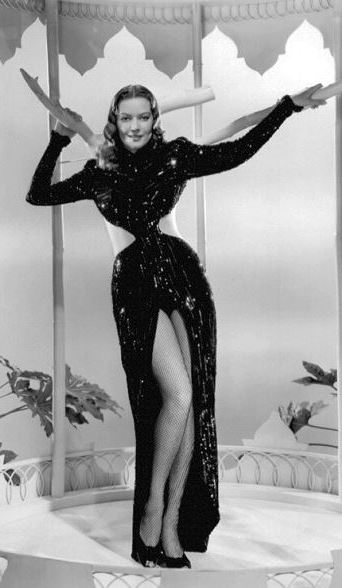 HAZEL BROOKS exudes luster, even in the inky-black you-name-it she's wearing here. In Hollywood's book Hazel's outfit may be thelast word. Personally, we're at a loss for the proper adjective to cover the situation.
HAZEL BROOKS exudes luster, even in the inky-black you-name-it she's wearing here. In Hollywood's book Hazel's outfit may be thelast word. Personally, we're at a loss for the proper adjective to cover the situation.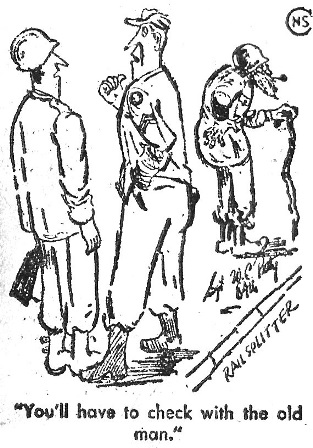
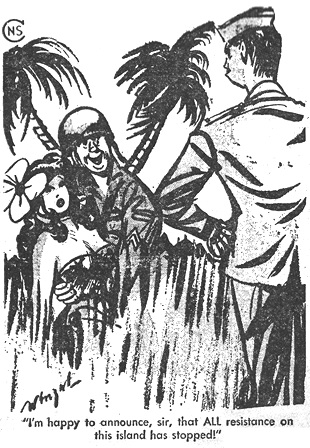
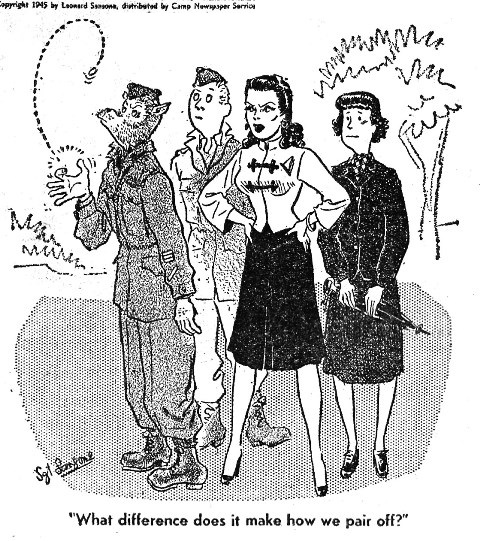
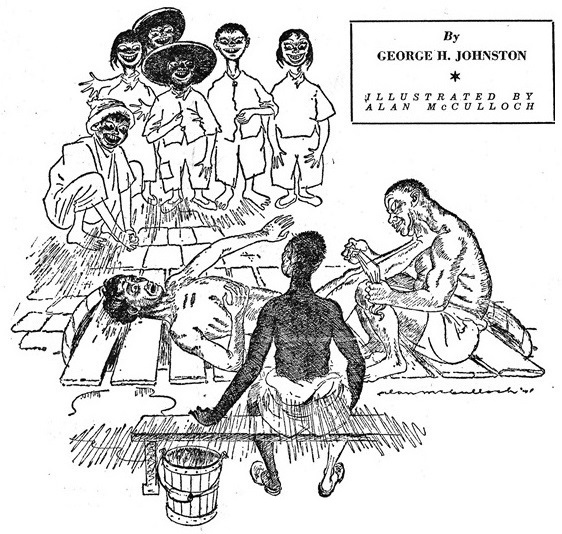
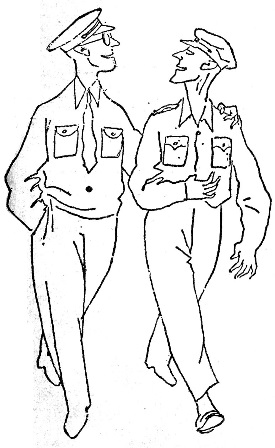
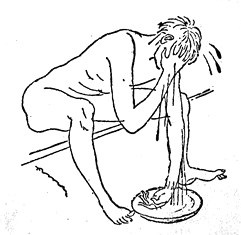
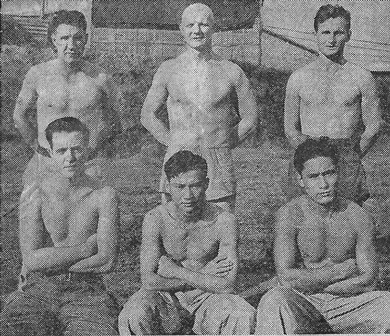 CCC SLUGGERS who will compete in the Championship Boxing Tournament of Allied Forces in China at the Hangar in Kunming on July 2, are, left to right, front row: Pvt. Ardell E. White, Salt Lake City, welterweight; Shung Chen, hostel house boy at CCC Headquarters, bantamweight;Pfc. Epifanio L. Garcia, San Antonio, Tex., middleweight. Standing: Pfc. Deacon Moore, Pateras, Wash., light heavyweight; Lt. Dimitri J. Tadich,East Chicago, Ind., former Pacific Coast intercollegiate heavyweight champion and coach of the team; Pfc. Hal W. Blackeby, Mount Kisco, N.Y., light heavyweight.Not shown are Pvt. James B. Tidsdale, Stanton, Tenn., middleweight and Pfc. John B. McCormack, East Quogue, N.Y., heavyweight. (Signal Corps photo).
CCC SLUGGERS who will compete in the Championship Boxing Tournament of Allied Forces in China at the Hangar in Kunming on July 2, are, left to right, front row: Pvt. Ardell E. White, Salt Lake City, welterweight; Shung Chen, hostel house boy at CCC Headquarters, bantamweight;Pfc. Epifanio L. Garcia, San Antonio, Tex., middleweight. Standing: Pfc. Deacon Moore, Pateras, Wash., light heavyweight; Lt. Dimitri J. Tadich,East Chicago, Ind., former Pacific Coast intercollegiate heavyweight champion and coach of the team; Pfc. Hal W. Blackeby, Mount Kisco, N.Y., light heavyweight.Not shown are Pvt. James B. Tidsdale, Stanton, Tenn., middleweight and Pfc. John B. McCormack, East Quogue, N.Y., heavyweight. (Signal Corps photo).